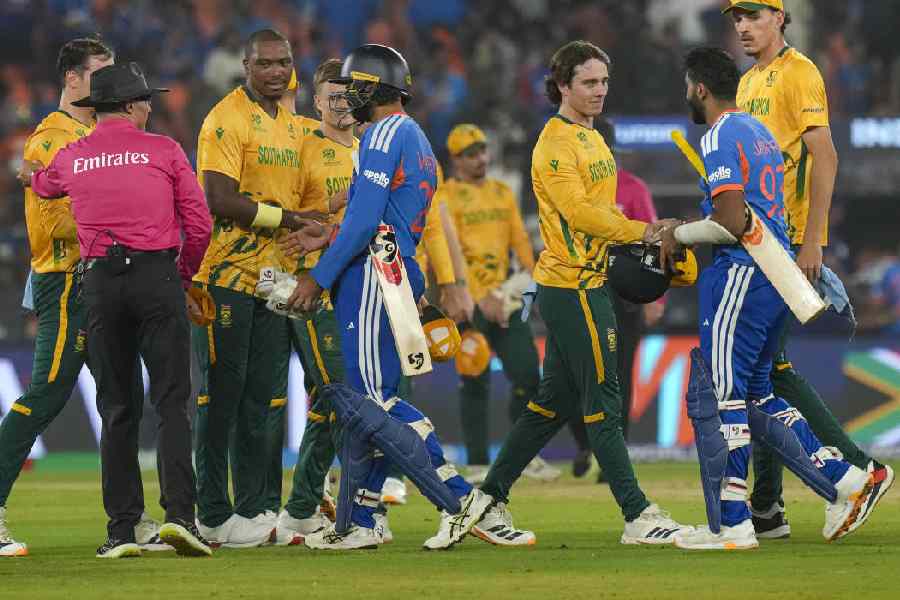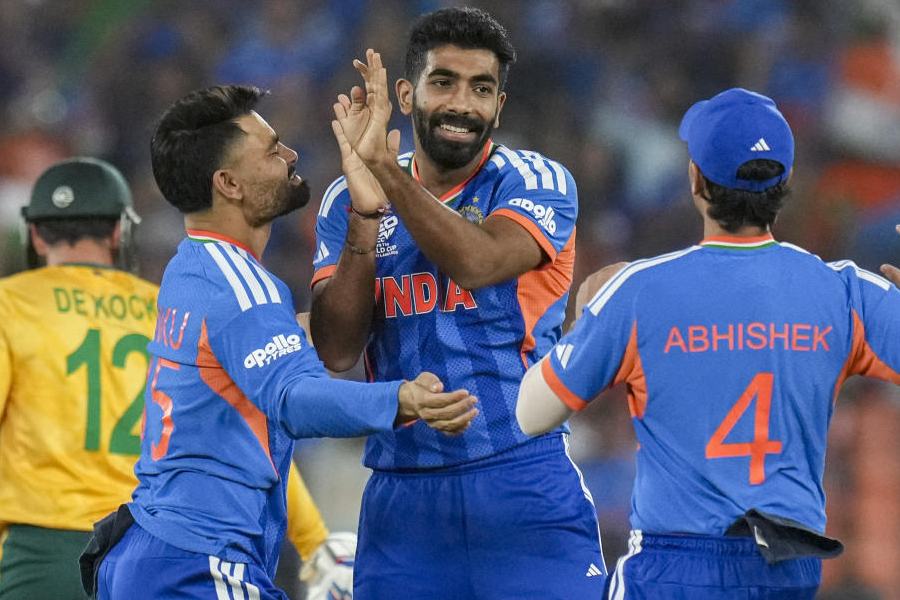This Friday, Nushrratt Bharuccha returns as the lead in the social horror film Chhorii 2, the follow-up to her 2021 film Chhorii, that focused on female foeticide and combined it with ample chills and thrills, spooks and scares. The Telegraph chatted with Nushrratt about the film, premiering on Prime Video, that introduces Soha Ali Khan into the mix, and more.
The trailer of Chhorii 2 is a standout. Given its visuals, one of the most repeated comments on YouTube is that the film should have released in theatres. Your thoughts?
As an audience, I am old school. For me, the love of the big screen will always be there. And horror, especially, is a big-screen viewing experience... the community viewing feel takes the joy of watching the genre to another level.
But one also needs to adapt to change. Our film releasing on streaming makes us reach a much larger audience in different parts of the world that we wouldn’t have had with a theatrical release.
What do you think worked for Chhorii and made it big enough to spur off a franchise?
When we did the first part, we were all just riding on the belief that the film will work because the Marathi original (Lapachhapi, also directed by Chhorii maker Vishal Furia), had connected with a lot of women in the audience.
Many years ago, I had done a film called Akaash Vani, hoping that its theme (marital abuse) would resonate with many women. But it didn’t do well. Chhorii gave me the opportunity to do another film with a similar sentiment. It did work with women, and with a lot of men as well, and I am glad for that.
Its theme (female foeticide) combined with horror really hit hard. Many told me how the film got under their skin and they couldn’t stop thinking and talking about it for days after. The film came with a shock value but what worked is that we didn’t sensationalise it. Neither did we get preachy. There was a point towards the end where I didn’t even want to say any dialogues... I just wanted the powerful images in the film to tell its story.
What can you tell us about Chhorii 2?
The trailer has made it clear that my character (Sakshi) survives the horrors of the first film and gives birth to her daughter after preventing her from getting sacrificed. But the evil entities haven’t left us yet. The people who Sakshi got away from haven’t really gone away. That is because this is not the kind of malaise or mindset that affects only one family or one village... this kind of attitude — that the girl child has to be killed — is rampant, and this is the thought that Chhorii 2 touches upon.
It is a cult of people out there, a mass practice. If they didn’t have the numbers, they wouldn’t have the guts to do what they have been doing. They are unabashed and unapologetic. Many of them are blinded by superstition that if they do something like this, their prosperity will grow. Or they are just gathered blindly under the guise of a faith or a ritual which actually doesn’t exist. It is also extreme conditioning over generations.
How do you look at the growth and evolution of the horror genre in Hindi cinema? Stree 2, which is a horror comedy, is one of the biggest hits of all time....
I am glad that horror is doing so well now, which wasn’t the case even till quite recently. A few years ago, Bollywood had come up with the term ‘horrex’, which was a combination of films with horror and sex. I could never understand how these two genres could even come together! But so many films were made in that genre.
I am happy we have moved from horrex to horror comedies because the latter brings in family audiences. If a horror comedy has given producers the courage to make more films, even if it is again a horror comedy, and it is bringing business back into the industry, then why not? The fact that horror comedies have worked has given makers the courage and creativity to bifurcate into sub-genres, which are also getting a market. Chhorii 2 is pure horror/ social horror and it will only benefit from this wave that the horror genre is riding on.
Along with entertainment, how important is it for you to do cinema that educates, like the Chhorii films and your 2022 venture Janhit Mein Jaari?
To be honest, the purpose of cinema is to entertain, to take people away from their daily lives and give them another world to experience for those two hours. The idea should always be: ‘Chalo yaar, let’s go and watch a movie, relax, forget all our worries....’ It is primarily for entertainment. Is it meant to spread knowledge? I don’t know. I think there are schools and other educational institutions for that.
But we also have to acknowledge the power of cinema and the responsibility that comes with it. The primary idea, I feel, is to entertain and if we can educate and make the audience aware in some way, without being preachy, then that is a win-win situation. While entertaining, if we can say something motivational, something inspirational, something that alters certain mindsets in society, then I am all for it.
But I also feel that only if someone is aware of something well, then only they have the right to talk about it. Don’t impart gyaan if you don’t know anything about what you are talking about in the first place.
It has been 15 years since your debut film Love Sex Aur Dhokha (LSD). What would you count as the turning points in your career so far?
The first would definitely be LSD. In those days, very few castings were making it to big films, or to any film for that matter. Which means that the hero and heroine were already locked and they would only cast for the supporting characters. In that scenario, I never expected to be cast as the lead. So for me, LSD was a turning point because I did get cast as a central character in a story. Even though my story was only the first 30 minutes (the film was a triptych), but I was still the lead character in the story... I was not playing the girl’s friend or the girl’s sister. That I was able to crack that audition was a big thing for me.
The second would be Pyaar Ka Punchnama. Actually, I didn’t want to do the film... I had even said ‘no’ to it. I didn’t like the story, I couldn’t relate to it. It wasn’t my world. And so, I refused it. But after that, I called up two of my closest actor friends who had worked with me on LSD. One was Rajkummar Rao and the other was Amit Sial. I valued their opinion and both of them told me the same thing. They were like: ‘Are you mad?’ (Laughs) They said: ‘If a film is being offered to you without you doing anything for it and you are being cast as a heroine, why would you reject it? What are you thinking?!’
That actually made me realise that I was being foolish in not wanting to do the film. I asked myself: ‘I am just a new kid on the block... why am I looking for a morality lesson in this film?’ I realised I had to do what was offered to me. I knew I had to survive first before I even came to that position where I would have the option to say ‘yes’ or ‘no’ to a film. So I did the film (opposite Kartik Aaryan) and, of course, it was a superhit. After that, another film (Pyaar Ka Punchnama 2) was made in the franchise, and I played the lead in that too.
The third turning point was the failure of Akaash Vani. What failure teaches you, nothing else can. When that failure hit me, I just changed. And from then to now, I have remained the same person. Whether a film is a hit or a flop, I remain grounded and normal.
Akaash Vani pushed me to a low phase for two years. I was so affected by the failure of that film that I had put so much work into that I didn’t even go to a theatre to watch a movie for two years! I disconnected from the art of and passion for cinema. I sat at home for two years, simply crying.
It was a good film... it just didn’t find an audience at that time...
Correct. It took me a long time to understand that a box-office flop doesn’t mean you have made a bad film or that I had done a bad job as an actor. That it is not a reflection of what my intent or my talent is. Similarly, a box-office success is not always a reflection of how brilliant a film is.










